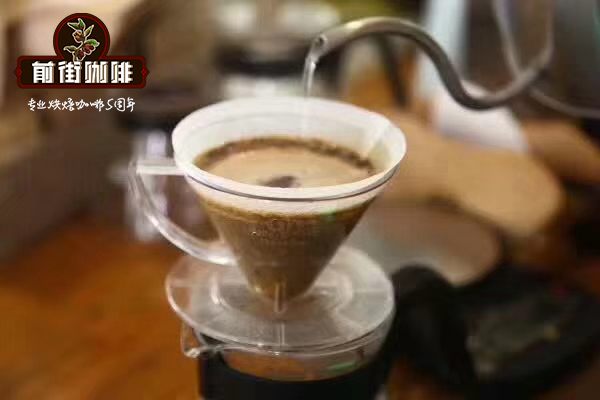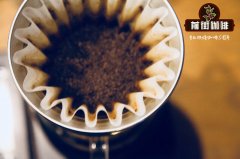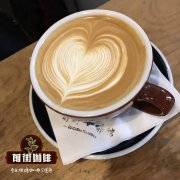What is the effect of water quality on coffee? What's the difference in brewing coffee with different water?

Professional coffee knowledge exchange more coffee bean information please follow the coffee workshop (Wechat official account cafe_style)
Coffee is not only for modern people to refresh themselves, but more importantly, whether at home or in the office, a cup of coffee can relax tired nerves and enjoy a moment of leisure. Many people are not satisfied with buying take-away coffee, but also buy coffee beans and bean grinders, hoping to make unique coffee, but they always find it a little less interesting. So what on earth affects the coffee we brew?
Pay attention to the acidity and basicity of water
First of all, since 98% of a cup of coffee comes from water, the most critical factor in determining whether this cup of coffee tastes good or not may be the water quality that you have been ignoring. Most people know that water quality can be divided into "soft" and "hard", and the hardness of water refers to the content of salts dissolved in water, generally taking the content of calcium and magnesium salts as the standard, the greater the content, the greater the hardness. Generally speaking, the water released from the faucet is hard and tastes bad, and some hardness will be reduced after boiling. And like the pure water we usually drink, the hardness is almost zero.
Magnesium in general hard water is particularly sticky, if the water contains a lot of magnesium, it will make coffee have a stronger taste and higher caffeine. At the same time, hard water also contains more carbonate, which may also be the source of coffee with a more bitter taste. In contrast, soft water often contains a lot of sodium, but it is not sticky, which means that coffee brewed with "hard water" will taste stronger if you use "hard water" instead of "soft water" to brew exactly the same beans. It is not recommended to brew coffee with distilled water or pure water, because the coffee produced by this kind of water tends to taste dull and lack a sense of hierarchy.
In order to satisfy people's perfectionist mentality of making coffee, some people also came up with the idea of water, and the United States launched a kind of water specially used to make coffee. However, there is no need to focus on which kind of water is more suitable, because personal preferences are different. People who like the smooth taste and sour taste of coffee can use soft water to brew coffee, and the aroma of beans will be more obvious when brewing. If you like coffee more bitter, you can use hard water to make coffee.
The storage temperature of coffee beans will affect
Place the coffee beans in an environment ranging from room temperature to-196 ℃. After several groups of control experiments, it is found that coffee beans in a lower temperature environment will have smaller and more uniform coffee particles when using the same bean grinder, which directly makes the extraction more sufficient. The conclusion of the effect of low temperature has also caused a sensation in the coffee industry.
Specifically, coffee beans were cooled in three different ways: frozen (- 19 ℃), dry ice (- 79 ℃) and liquid nitrogen (- 196 ℃). The results showed that the taste of the three cooling methods was better than that of room temperature coffee beans, and the coffee beans with the lowest temperature performed best. "the performance of coffee beans was inversely proportional to temperature, and the coffee beans stored between room temperature and-19 ℃ had the greatest difference. "
Freezing the coffee before grinding can make the size of the coffee powder more uniform and the particles more closely arranged, so that the coffee flavor can be more fully extracted and the coffee will become more delicious. At the same time, the researchers also said that in addition to being more mellow, another windfall is that frozen coffee beans are more utilized and fewer beans are needed for a cup of coffee. "the quality of refrigerated coffee is better because the lower the temperature, the smaller the gap between the coffee molecules and the more orderly the arrangement, so in the brewing process, when using the same amount of coffee, more flavor can be extracted. "
The grinding mode of bean grinder should be adjusted.
With the perfect coffee beans, the next step is the bean grinder. After grinding with different bean grinders, the structure of the powder is completely different. Through grinding, it can be observed that the powder structure and shape of different knife shapes are completely different. The structure of powder particles is related to whether the extraction is uniform or not, which will affect the flavor of coffee.
The propeller type bean grinder is rejected by many people because the coffee powder it grinds is uneven. If there are conditions, it is best to choose a plate type bean grinder. Two parallel gears grind each other, and the coffee powder is evenly ground.
As to how fine it should be ground, there has always been a debate. The finer the coffee beans are ground, the more they can maximize the surface area of the particles in contact with water to extract the best coffee flavor, but at the same time, grinding too fine will also make it easier to gather into lumps when brewing coffee powder, which is not conducive to brewing. And if the coffee beans are ground too fine, excessive extraction will give off astringent taste, which may also damage the taste. So this degree may have to be adjusted slowly according to your own taste.
The combination of coffee and water has its advantages and disadvantages.
The last step is to combine the ground coffee powder and water perfectly.
In the way of brewing, it is divided into two camps, one is to soak all the coffee powder into the water to extract, that is, the "soaking type", and the other is to let the water flow through the coffee powder, that is, the "filter type".
Generally speaking, the soaking type has a lower extraction efficiency, but it can be more convenient and just right to achieve the extraction purpose, so that the taste of the brewed coffee is more balanced, there will not be too many accidents, and it is safer.
The coffee brewed by filtration is more complicated. The time of soaking can be controlled, while the extraction time of filtration depends on the thickness of coffee powder, because this directly affects the speed of the flow of water. Therefore, the filter overall extraction efficiency is high, the taste is more prominent, giving users more room for change, but at the same time, it is easy to have a large deviation between the two cups of coffee, making baristas lose their footing.
In addition, the ratio of coffee to water is also very important. The finer the coffee powder, the more fully extracted, but the speed at which the water flows will be slower accordingly. If you reduce the amount of coffee at this time, the extraction time will also be shorter than before. In other words, filtered coffee is a chain reaction with more variables and more complex variables.
Important Notice :
前街咖啡 FrontStreet Coffee has moved to new addredd:
FrontStreet Coffee Address: 315,Donghua East Road,GuangZhou
Tel:020 38364473
- Prev

How can coffee be extracted in addition to hand brewing? How to extract coffee?
Professional coffee knowledge exchange more coffee bean information please pay attention to coffee workshop (Wechat official account cafe_style) Coffee extraction methods generally there are several ways to use filter paper in drip coffee, use filter paper in drip coffee, use hanging ear coffee bag in drip coffee, use flannel cloth to filter coffee machine in drip coffee, some need to use filter paper, some directly use machines.
- Next

Why is the milk foam of coffee not easy to spill? How do I play the coffee foam? How milk turns into bubbles
Professional coffee knowledge exchange more coffee bean information Please pay attention to the coffee workshop (Wechat official account cafe_style) A cup of take-away coffee, showing the rapid pace of urban life. In order to make it easy to carry, the store will put a cover on the paper cup to keep the coffee warm and prevent the coffee from splashing. Curiously, if not sealed, which kind of coffee is less?
Related
- Beginners will see the "Coffee pull flower" guide!
- What is the difference between ice blog purified milk and ordinary milk coffee?
- Why is the Philippines the largest producer of crops in Liberia?
- For coffee extraction, should the fine powder be retained?
- How does extracted espresso fill pressed powder? How much strength does it take to press the powder?
- How to make jasmine cold extract coffee? Is the jasmine + latte good?
- Will this little toy really make the coffee taste better? How does Lily Drip affect coffee extraction?
- Will the action of slapping the filter cup also affect coffee extraction?
- What's the difference between powder-to-water ratio and powder-to-liquid ratio?
- What is the Ethiopian local species? What does it have to do with Heirloom native species?

